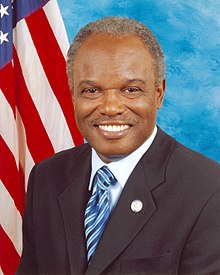BLACK SOCIAL HISTORY
David Scott (Georgia politician)
| David Scott | |
|---|---|
 | |
| Member of the U.S. House of Representatives from Georgia's 13th district | |
| Assumed office January 3, 2003 | |
| Preceded by | None (New District Created After 2000 Census) |
| Personal details | |
| Born | David Albert Scott June 27, 1945 Aynor, South Carolina |
| Political party | Democratic |
| Spouse(s) | Alfredia Scott |
| Residence | Atlanta, Georgia |
| Alma mater | Florida A&M University,University of Pennsylvania |
| Occupation | advertising executive |
| Religion | Baptist |
David Albert Scott (born June 27, 1945) is the U.S. Representative for Georgia's 13th congressional district, serving since 2003. The district includes the southern fourth of Atlanta, as well as several of its suburbs to the south and west. He is a member of theDemocratic Party.
Early life and education
Scott was born in Loris, South Carolina and attended high school in Daytona Beach, Florida. He received a bachelor's degree in finance from Florida A&M University, and a master's degree in business from the Wharton School of the University of Pennsylvania. Scott is a member of Alpha Phi Alpha fraternity.[1]
Georgia Legislature
Scott served in the Georgia House of Representatives from 1974 to 1982 and in the Georgia State Senate from 1982 to 2002.
U.S. House of Representatives
Committee assignments
Party leadership
- Co-Chair of the Democratic Study Group on National Security
Scott was the lead sponsor on the following legislation:
- The Financial Literacy Act - an act to provide education to investors and home buyers
- The Access to Healthcare Insurance Act, extending affordable healthcare coverage
- The Extension for Unemployment Benefits and the Overtime Pay Protection Acts
- The Moment of Silence Act for reflection or prayer at the start of each school day in the nation's public schools
- The Retired Pay Restoration Act, giving veterans both retirement and disability pay
- The Zero Down Payment Act which eliminates the down payment requirement for middle and low income families who buy homes with a FHA insured mortgages
- The Mutual Fund Integrity Act which strengthens regulations of the stock market
Political positions
Online gambling
Scott is a staunch advocate of a federal prohibition of online poker. In 2006, he cosponsored H.R. 4777, the Internet Gambling Prohibition Act[2] and voted for H.R. 4411, theGoodlatte-Leach Internet Gambling Prohibition Act.[3] In 2008, he opposed H.R. 5767, the Payment Systems Protection Act (a bill that sought to place a moratorium on enforcement of the Unlawful Internet Gambling Enforcement Act while the U.S. Treasury Department and the Federal Reserve defined "unlawful Internet gambling").
Healthcare Reform
David Scott voted for healthcare reform. In the discussion leading up to his vote, Congressman Scott fielded several different points of view. On August 6, 2009, Scott was confronted by a local doctor who claimed to live in Scott's district. The doctor, who later appeared in subsequent debates with his opposition candidate, asked Scott why he was going to vote for a health care plan similar to the plan implemented in Massachusetts and if he supported a government-provided health care insurance option. Scott questioned whether or not the doctor was a resident of Scott's district, although the local TV station WXIA-TV's news department confirmed that the doctor did live and work in Scott's district.[4] Scott also noted that Dr. Hill had not called Scott's office for setting up a meeting concerning health care but this has not been verified.[5] Scott has allegedly received death threats from neoconservative activists.[6] A swastika was found spray painted on a sign outside of his congressional office in his congressional district, reportedly painted by neoconservative activists. An investigation is underway.[7]
Fiscal policy
Although Scott voted against the first version of the 2008 bailout, he backed the final version "after being assured the legislation would aid homeowners facing foreclosures. Scott crafted an added provision dedicating $14 billion to aid those homeowners."[8]
Same-sex marriage
Scott supported two failed pieces of legislation in 2004 and 2006 that aimed to establish a constitutional amendment banning same-sex marriage.[8][9] However, in May 2013 thinkprogress.org reported receiving an email from a spokesman of Scott saying, 'Congressman Scott fully supports marriage equality.'[10] HRC's profile of Scott also contains this sentence as his statement under 'position on marriage equality'.[11]
Iran deal
Scott has announced his opposition to the nuclear deal with Iran, saying that “It’s a good deal for Iran, for Russia, China and probably Hezbollah, but is it not, definitely not a good deal for Israel or for the United States or our allies – especially Jordan and Saudi Arabia . . . ” [12]
Personal life
David Scott is brother-in-law to baseball hall of fame member Hank Aaron.
In 1978 David Scott founded owned Dayn-Mark Advertising (from the names of his two daughters, Dayna and Marcie), which places billboards and other forms of advertising in the Atlanta area. Scott's wife, Alfredia, now heads the business. In May 2007, it was reported that the business owes more than $150,000 in back taxes and penalties.[13] Scott's campaigns have paid the company more than $500,000 over the eight years totalling from 2002 until current date - for office rent, printing, T-shirts, and other services. He has also paid his wife, two daughters, and son-in-law tens of thousands of dollars for campaign work such as fund raising and canvassing. In 2007, Scott was named one of the 25 most corrupt members of Congress by the political watchdog group Citizens for Responsibility and Ethics in Washington.[14]

































































No comments:
Post a Comment